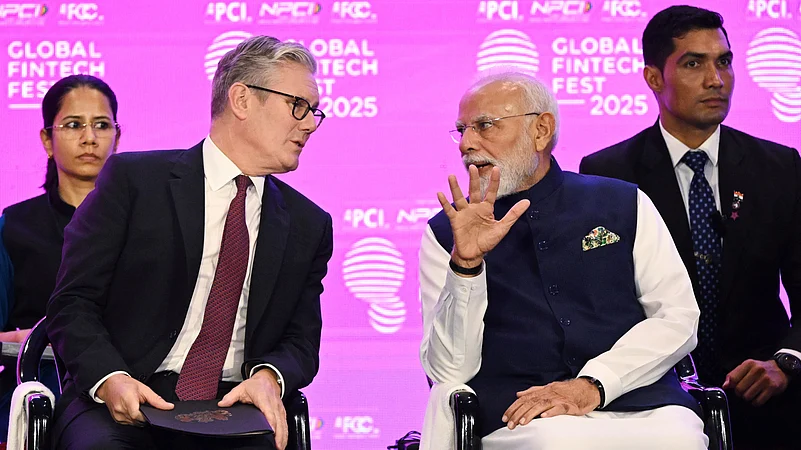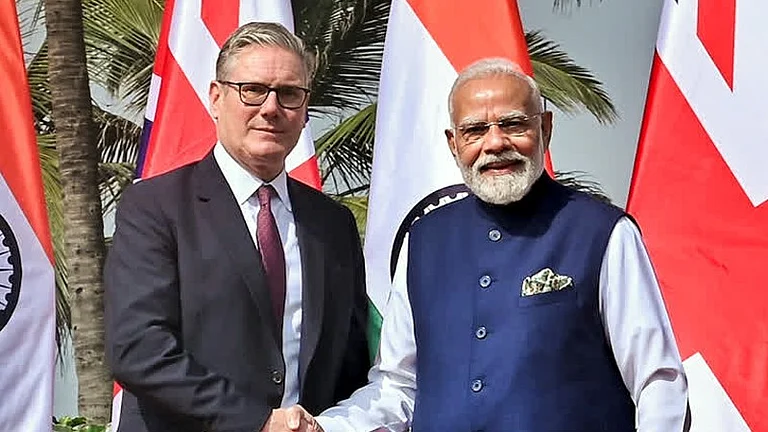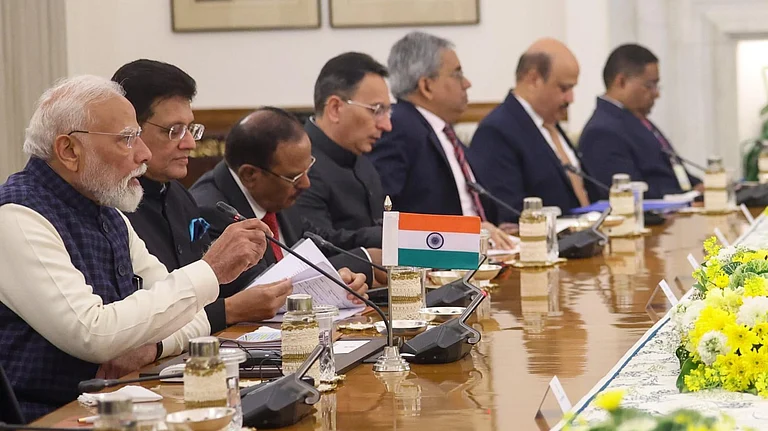
Keir Starmer’s India visit strengthens India–UK ties in trade, defence, and tech.
Both nations fast-tracked CETA ratification and repositioned JETCO for oversight.
New India–UK centres announced for AI, 6G, and critical mineral collaboration.
Education, climate innovation, and maritime defence partnerships received major policy boosts.
British Prime Minister Keir Starmer’s first official visit to India over the last two days marked a new roadmap for the two countries as they deepened cooperation across trade, technology, education and defence.
Both the countries reaffirmed their commitment to a rules-based global order and a modern, forward-looking partnership. Prime Minister Narendra Modi and British PM outlined a renewed strategic direction anchored in the recently-signed India–UK Comprehensive Economic and Trade Agreement (CETA).
Releasing a joint statement, the two leaders agreed to move the ratification of the CETA quickly and reposition the Joint Economic and Trade Committee (JETCO) as the central mechanism to oversee its implementation. Additionally, both the countries said that the agreement is expected to create new economic opportunities in priority sectors like clean energy, advanced manufacturing, defence, education, science, and digital innovation.
The British delegation in India included Secretary of State for Business and Trade Peter Kyle and over 125 business and institutional leaders, who highlighted the UK’s renewed economic outreach to India. Both the governments called the visit to India as a defining moment for bilateral relations, with India now seen as a key growth engine for global trade and investment.
What’s the Deal?
As a part of the deal between India and UK, there will be a major expansion in terms of science, innovation and frontier technologies. Both the sides announced the establishment of a joint hub to develop AI-native networks for 6G and cyber-secure telecom infrastructure, known as the India–UK Connectivity and Innovation Centre. According to PM Modi’s office, the centre will be receiving a initial joint funding of £24 million.
In addition to this, the leaders also launched the India–UK Joint Centre for AI to promote responsible and trustworthy AI applications in healthcare, climate technology, fintech, and engineering biology. Additionally, a new Critical Minerals Industry Guild was also announced to secure resilient mineral supply chains, backed by Phase II of the UK–India Critical Minerals Supply Chain Observatory, that will open a new satellite campus at IIT-ISM Dhanbad.
Major Points of Cooperation
In terms of climate cooperation, both the Prime Ministers launched a Climate Technology Startup Fund under an MoU between the government of UK and the State Bank of India. The fund will also support startups in clean technology, climate innovation and AI-driven solutions for sustainability. Besides these, a joint Offshore Wind Taskforce was launched that is expected to explore collaborations through the Global Clean Power Alliance (GCPA).
In a major boost to the education and knowledge partnership, both Modi and Starmer embraced the progress made by UK universities in establishing branch campuses in India. Notably, the University of Southampton has begun classes at its Gurugram campus, while new Letters of Intent were handed over to Lancaster University for Bengaluru and the University of Surrey for GIFT City. On the other hand, the University Grants Commission (UGC) has also cleared approvals for Liverpool, York, Aberdeen, and Bristol universities to operate in India, with Queen’s University Belfast, and Coventry University expanding in GIFT City in Ahmedabad.
This is viewed as a move that is part of India’s effort to internationalise higher education and attract global talent and investment in research and innovation.
Deeper Agreements in Defence and Security
India and the UK has agreed for much deeper bilateral exchanges between their armed forces through training, joint exercises, and technology partnerships. The upcoming visit of the UK’s Carrier Strike Group and the continuation of Exercise KONKAN between the two navies was also welcomed by Prime Minister Narendra Modi.
Both the Prime Ministers have also agreed to finalise an Inter-Governmental Agreement (IGA) on developing maritime electric propulsion systems for Indian Naval platforms. They confirmed the government-to-government route for the supply of Lightweight Multirole Missile (LMM) systems and this collaboration is expected to support long-term industrial partnerships under Atmanirbhar Bharat.
Additionally, plans to establish a Regional Maritime Security Centre of Excellence under the Indo-Pacific Oceans Initiative (IPOI) was also announced, with an aim to improve maritime domain awareness and regional security cooperation.
In a jointly issued statement against terrorism, the two leaders called for “zero tolerance” toward extremism and reaffirmed their commitment to take decisive actions against proscribed terrorist groups and their sponsors. They also strictly condemned the April 2025 terrorist attack in Pahalgam and agreed to enhance cooperation in counterterrorism financing, intelligence sharing as well as capacity building.



































